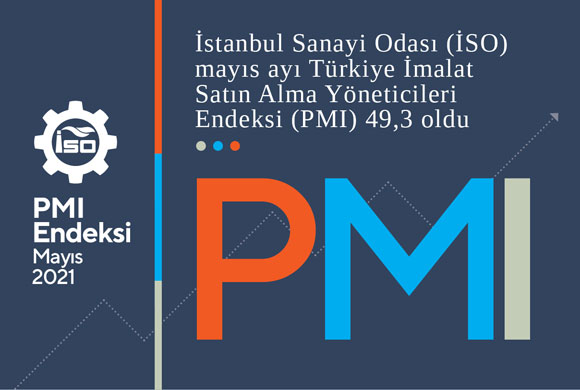News
May 2021 Report of ICI Türkiye Manufacturing PMI and Türkiye Sector PMI Released
- 01.06.2021
- News

The Istanbul Chamber of Industry (ICI) Türkiye Manufacturing PMI (Purchasing Managers’ Index), which is the fastest and reliable reference accepted in manufacturing industry performance of the economic growth, posted 49.3 in May, below the 50.0 no-change mark for the first time in a year. That said, the moderation in business conditions signalled by the PMI was only marginal.
According to the ICI Türkiye Manufacturing PMI data of May, seven out of 10 monitored sectors showed slow-down in output in May. Food products was the top performing sector in terms of output, while the wood and paper products sector and the machinery and metal products sector saw the significant drop. Food products, electronic & electrical equipment and basic metals sectors posted expansion. The sharpest decrease in orders was in electronic & electrical equipment and eight out of 10 sectors saw increase in employment.
The May 2021 period of Istanbul Chamber of Industry (ISO) Türkiye Manufacturing PMI (Purchasing Managers’ Index) survey, which is the fastest and reliable reference accepted in manufacturing industry performance of the economic growth was announced. According to the results of the survey where any figure greater than 50.0 indicates overall improvement of the sector, the headline PMI registered 49.3 in May, down from 50.4 in April and below the 50.0 no-change mark for the first time in a year. That said, the moderation in business conditions signalled by the PMI was only marginal.
The COVID-19 lockdown, and associated softening of client demand, led to moderations in both output and new orders during May. Although more marked than in April, the respective rates of easing were much less pronounced than during the first wave of the pandemic last year. New export orders also slowed, ending a four-month sequence of growth. Manufacturers continued to raise their workforce numbers midway through the second quarter, but hiring was also impacted by COVID-19 restrictions. As a result, the rate of job creation eased to the weakest in the current 12-month sequence of rising employment. Supply-chain disruption was again a feature of the latest survey. Difficulties securing raw materials often led to increases in their prices. Input costs rose sharply again in May, and at a slightly faster pace than in the previous month. Weakness in Turkish currency was also reportedly a factor behind higher input costs. In turn, firms raised their own selling prices, and at a steep pace that was the strongest in the year-to-date. Purchasing activity was scaled back marginally in May, and stocks of purchases also moderated, in part due to difficulties securing materials.
Commenting on the Istanbul Chamber of Industry Türkiye Manufacturing PMI survey data, Andrew Harker, Economics Director at IHS Markit, said: “It is of little surprise that the COVID-19 lockdown restrictions that were in place for much of May had a detrimental effect on the Turkish manufacturing sector over the course of the month. Firms will be hoping that the lockdown had the desired effect in bringing infections under control, and that a swift return to growth will be seen now that measures have started to ease. Less transitory seem to be the problems in supply chains, which remained widespread in May and contributed to strong inflationary pressures.”
Manufacturing slowed down in most of the sectors
According to the ICI Türkiye Manufacturing PMI data of May, seven out of 10 monitored sectors showed slow-down in output in May. The most significant decrease was in the wood and paper products and the machinery and metal products sectors. Food products, electronic & electrical equipment and basic metals sectors posted expansion. Food products was the top performing sector in terms of output, as it was the case at the beginning of the first wave of Covid-19 pandemic. The same applies to the orders, where only four out of ten sectors saw expansion and the food products sector was the top performing sector. The sharpest decrease in orders was in electronic & electrical equipment. Employment trends were mostly positive and eight out of 10 sectors saw increase in employment. The only exception was the wood and paper products sector and the clothing and leather products sector. The highest increase in employment was posted by the basic metals sector.
Suppliers’ lead times continued to increase in general, while the basic metals and the electronic and electrical equipment sectors had the most significant deterioration. Difficulties in supply of input contributed to the inflationary pressures and the weakness in Turkish currency also a factor behind higher input costs. Even though the input costs saw lower rate of increase compared to April in most of the sectors, the input costs inflation continued to remain significant. The highest increase in cost burdens was in the basic metals sector. And the highest final product price inflation among the monitored sectors was in the machinery and metal products sector. The lowest price increase on the other hand was in the clothing and leather products sector where the pricing power was affected by a slow-down in new orders. Decrease in backlogs caused by restrictions led to limitation of purchasing activities of companies in many sectors. On the other hand, the difficulties in supply of materials led to decrease in input stocks, even in the sectors that saw increase in input purchases. All the sectors posted drops in final product inventory.